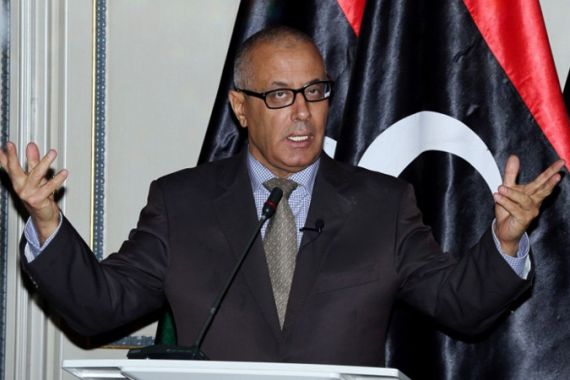Profile: Ali Zeidan
Ali Zeidan, seized by armed men from hotel in capital Tripoli, spent years in exile before Gaddafi was toppled.

Ali Zeidan has been Libya’s prime minister for nearly one year, having been appointed by the General National Congress last October. He took office on November 14 after Congress approved his cabinet nominees.
When the civil war that toppled Muammar Gaddafi started in 2011, Zeidan was working as a human rights lawyer in Geneva, Switzerland. He is considered by some local observers as a strong-minded liberal.
Ali Zeidan served as a diplomat for Libya in the 1970s under Ambassador Mohammed Magariaf. Both men defected in 1980 and went on to form the National Front for the Salvation of Libya. Zeidan spent nearly three decades in exile in Geneva after the defection.
Zeidan also served as Europe envoy for the National Transitional Council, an interim administration set up by forces that overthrew Gaddafi’s government, and he is said to have played a key role in persuading then French President Nicolas Sarkozy to support the anti-Gaddafi forces.
On July 7, 2012, Zeidan was elected as an independent congressman for Jufra in the Congressional election held that year. He ran for the position of Speaker of the Congress but was defeated by his former opposition colleague Mohammed Magariaf.
Zeidan resigned his seat in the Congress in October 2012, after Mustafa Abushagur, the then prime minister, failed to form a government. He stood as a candidate for prime minister against the Justice and Construction Party’s favoured candidate, Mohammed Al-Harari.
Zeidan polled 93 votes against 85 of his challenger, drawing support from members of Congress belonging to the generally liberal National Forces Alliance (organised by Mahmoud Jibril), as well as by certain independents informally allied with the Workers group and the Southern group.
Zeidan’s cabinet was approved by Congress on October 31, 2012, although six of its members faced a probe for their alleged links to Gaddafi’s regime. All six were subsequently cleared of the charges and Zeidan’s government was sworn in about two weeks later.
Zeidan’s cabinet sought to strike a geographical as well as political balance, appointing ministers from the National Forces Alliance, the Justice and Construction Party, and independents.